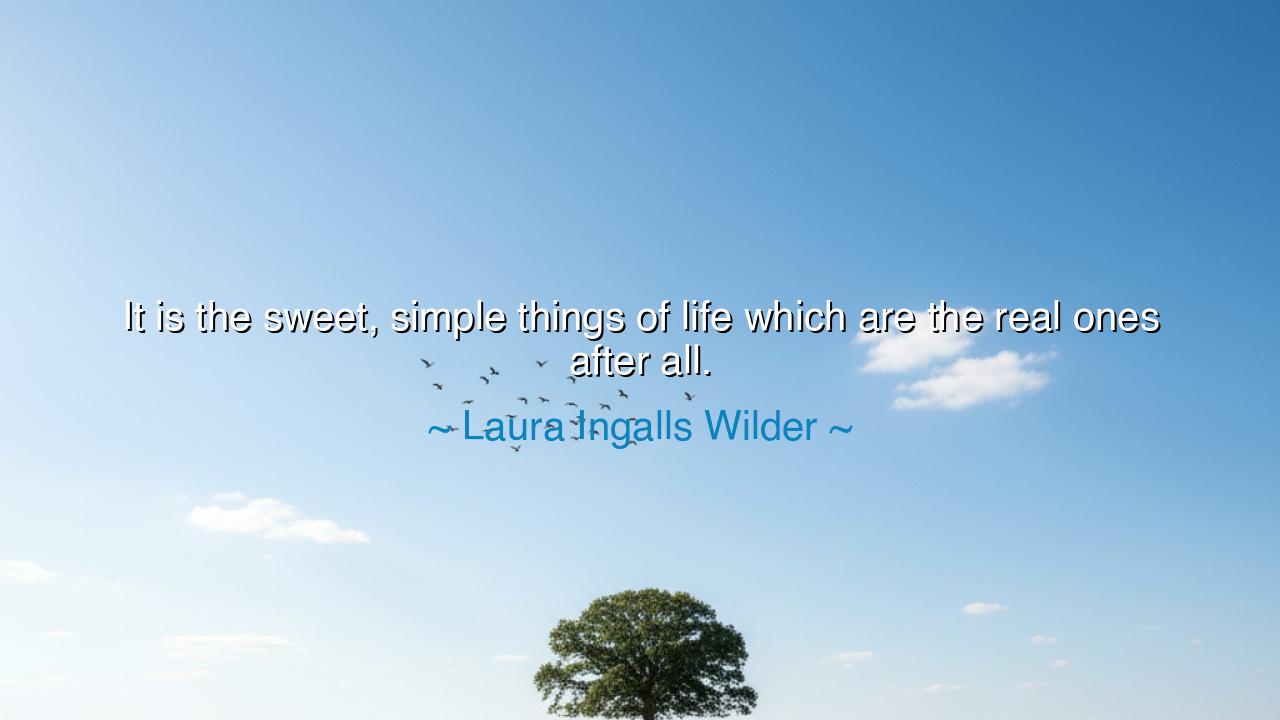
It is the sweet, simple things of life which are the real ones






Hear, O children of the earth, the tender words of Laura Ingalls Wilder: “It is the sweet, simple things of life which are the real ones after all.” In these words speaks not only a woman of pioneer days, but the timeless wisdom of generations who found joy not in riches or grandeur, but in the humble blessings that sustain the heart. Wilder, who lived through hardship and change, reminds us that when all else fades, it is the simple things—family, love, bread on the table, the warmth of a hearth—that remain the true treasures of life.
The origin of this saying rests in Wilder’s life itself. Born in the 19th century, she grew up in log cabins, moved across the frontier, and endured both hardship and beauty in equal measure. Her stories, immortalized in the Little House books, were not of kings or empires, but of families gathering for supper, children playing under vast skies, and communities binding together in faith and labor. From this life of simplicity, she saw clearly what many in wealthier times forget—that sweetness lies in simplicity, not in the abundance of possessions.
The ancients, too, bore witness to this truth. The Stoic philosophers of Greece and Rome declared that the good life is not found in excess but in contentment, that a man with bread, water, and a roof may be richer than emperors. The Hebrew psalms sing that better is a simple meal with peace than a feast with strife. Even in the East, the sages of China and India spoke of harmony with nature and the sufficiency of little. Wilder’s words flow from this same eternal river: that true wealth lies not in the abundance of things, but in the purity of life lived simply.
History offers many mirrors of this lesson. Consider Mahatma Gandhi, who owned little more than a staff, a spinning wheel, and a handful of cloth, yet whose life shook empires and inspired millions. He found joy in the simplest acts: spinning thread, walking barefoot, sharing plain meals. His strength lay not in accumulation, but in simplicity. Like Wilder, he declared to the world that it is not the grand or complex that makes life real, but the simple truths lived faithfully.
The meaning of Wilder’s words is deeply emotional: simplicity unveils reality. In the rush of ambition, in the chase for wealth or acclaim, people often lose sight of what is real. Houses grow larger but hearts grow emptier; possessions multiply but joy diminishes. Yet in the stillness of a morning sunrise, in the laughter of a child, in the taste of bread after labor, the soul remembers what is true. These things, though overlooked by many, are the pillars of a life well-lived.
The lesson for us, O listeners, is clear: seek the simple, honor the small, cherish the ordinary. Do not despise humble things, for they hold the essence of joy. A meal shared with family, a walk beneath the stars, a kind word to a neighbor—these are greater treasures than gold. To neglect them is to miss the very heart of life. Wilder calls us back to what is lasting, to the truth that what is simple is also eternal.
Practical actions stand before you: Each day, pause to notice the simple blessings around you. Turn off the noise of excess and dwell on the beauty of small things—a flower, a conversation, a quiet breath. Do not wait for great wealth or achievements to celebrate life; instead, honor the sweetness that already surrounds you. And when you build your life, build it upon what is real: love, kindness, family, faith, and gratitude.
Thus, remember the teaching of Laura Ingalls Wilder: “It is the sweet, simple things of life which are the real ones after all.” Let this truth shape your days. When life grows heavy with complexity, return to the simple joys. When ambition clouds your vision, look again at the quiet gifts you already hold. For in simplicity lies strength, in humility lies joy, and in the sweet and simple lies the eternal essence of life.






AAdministratorAdministrator
Welcome, honored guests. Please leave a comment, we will respond soon